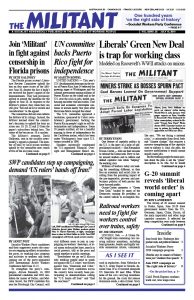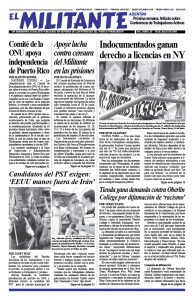Oberlin College President Carmen Twillie Ambar and other officials have launched a media blitz to falsely portray the June 7 verdict by a Lorain County jury as a dangerous attack on free speech. The jury found the college guilty of maliciously trying to “permanently harm and damage” Gibson’s family-run Oberlin bakery by promoting false statements that the business and its owners are racist.
The jury awarded the Gibson’s $44 million in compensatory and punitive damages, considerably higher than state regulations usually permit. The judge lowered the award to a still substantial $25 million. A hearing on fees for the Gibson’s lawyers is set for July 10.
Ambar began a whirlwind media tour at the end of June, holding a press conference, contacting alumni and giving interviews to CBS News, NPR Radio, Newsweek and the Wall Street Journal. She denied that the college had smeared the Gibsons or was guilty of anything and discounted the jury’s decision, claiming “this is a First Amendment case about whether an institution can be held liable for the speech of its students and the actions of its students,” she told NPR.
Nothing could be further from the truth.
The Gibson’s lawsuit wasn’t directed at free speech or the right to protest, but at actions and slanders carried out by Oberlin College officials.
The dispute began when some students, encouraged by college officials, began protests outside the store, falsely claiming its owners had a long history of “racial profiling,” after three Black students were arrested for attempting to shoplift two bottles of wine from the bakery on Nov. 9, 2016, and assaulting Allyn Gibson, grandson of the owner, who tried to stop them. They later pled guilty to misdemeanor charges and acknowledged that Gibson’s response was not racially motivated.
College officials printed and helped distribute flyers for the smear campaign and cancelled the bakery’s contract with the campus dining services for two months, and again after the lawsuit was filed. Guides for official campus tours advised prospective students and their families not to shop at Gibson’s because it is a “racist establishment” that “assaults students.” The college even positioned construction equipment to block a parking lot owned by Gibson’s. The bakery has done business with the college for 100 years.
In response to the college’s attempt to reframe the case “as a First Amendment issue,” Gibson’s’ lawyers released a 56-page FAQ June 28 that demolishes Ambar’s twisting of the facts.
“Even after the jury’s verdict,” the lawyers said, “the college refuses to take responsibility for its actions.”
The FAQ consists of evidence introduced at the trial — emails, letters and testimony from current and former Oberlin College employees, alumni and town residents. These documents demonstrate the arrogance and scorn for anyone who disagrees with them by Dean of Students Meredith Raimondo and other college officials in the face of attempts by many individuals to get the college to reverse course. From this evidence it’s not hard to see why the jury ruled that the college acted with malice.
One example? Oberlin College employee Emily Crawford was told by college Vice President for Communications Ben Jones in a Nov. 11, 2016, email that the police report on the shoplifting and arrests “is bullshit.” He then asked her “what are you hearing in your recon?”
Crawford replied that “the students are on the wrong side of this protest, they acted without ascertaining the facts first.” She told Jones that “I have talked to 15 townie friends who are poc [people of color] and they are disgusted and embarrassed by the protest.”
“To them this is not a race issue at all and they do not believe the Gibsons are racist.”
The response from Tita Reed, an assistant to the Oberlin president? “Doesn’t change a damned thing for me.”
Three days later then-college President Marvin Krislov emailed Reed that students are talking about urging the college to stop buying anything from Gibson’s. Reed responds, “That’s a great bargaining chip,” and the college does so.
Amber also ignores the testimony from several witnesses at the trial that Dean Raimondo spoke at the Nov. 10 protest and handed out flyers calling Gibson’s “a RACIST establishment with a LONG ACCOUNT of RACIAL PROFILING and DISCRIMINATION.”
The class disdain of Oberlin College officials — by far the largest business in town — towards the family-run bakery led them to underestimate the support that working people in the area would show the bakery owners. Many Oberlin residents displayed signs in support of Gibson’s, and others, outraged by the slanders and the boycott, mobilized to shop there. But the outsized weight of the college meant the bakery lost business.
David Gibson wrote in an op-ed in USA Today June 21 that the family decided to file the suit after his father told them, “In my life I’ve done everything I could to treat all people with dignity and respect. And now, nearing the end of my life, I’m going to die being labeled as a racist.”
The victory won by the family against the college is a gain for all working people.

